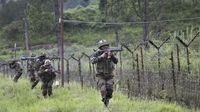As tensions escalate between India and Pakistan following a deadly terror attack in Jammu and Kashmir, Pakistan has begun mobilizing its military forces along the border, raising concerns of potential conflict. The Pahalgam attack, which occurred on April 22, 2025, resulted in the tragic deaths of 26 civilians, prompting fears of an imminent Indian military response.
In the wake of the attack, Pakistan's military has taken significant precautionary measures. Reports indicate that the Pakistani Army is positioning its Navy vessels, including frigates and submarines, within their respective harbors to prepare for any possible Indian naval operations. This strategic move reflects the heightened state of alert within Pakistan's defense apparatus.
On April 29, 2025, Pakistan's Information Minister, Attaullah Tarar, claimed that the country has received "credible intelligence" suggesting that India may launch a military strike against Pakistan within the next 24 to 36 hours. In a post on X, Tarar stated, "Pakistan has credible intelligence that India intends to carry out military action against Pakistan in the next 24-36 hours on the pretext of baseless and concocted allegations of involvement in the Pahalgam incident." This statement underscores the escalating rhetoric between the two nations.
The situation has been exacerbated by India's recent military preparations. Prime Minister Narendra Modi has granted the Indian armed forces "complete operational freedom" to respond to the Pahalgam attack. This decision was made during a high-level meeting attended by key defense officials, including Defense Minister Rajnath Singh and National Security Advisor Ajit Doval. Modi's directive allows military leaders to determine the timing, targets, and methods of India's response, signaling a potential shift in India's military posture.
In response to the perceived threat, the Pakistan Air Force has reduced its flying operations by over 50 percent, limiting flights to essential operations only. This reduction aims to minimize confusion in the airspace as tensions rise. Additionally, the Pakistani Army is relocating its radar systems to forward positions in the Sialkot sector to better detect any incoming Indian airstrikes. Electronic warfare units are also being deployed to monitor Indian movements across the border.
Recently, the Pakistan Air Force (PAF) has been observed moving aircraft from Karachi to bases near Lahore and Rawalpindi, further indicating the seriousness of the situation. Flight tracking data from Flightradar24 shows this unusual activity, suggesting that the PAF is bracing for potential conflict.
On the Indian side, military exercises have been ramped up in response to the Pahalgam attack. India's frontline fighter jets, including Rafales, participated in a large-scale military exercise called "Aakraman," aimed at showcasing the Indian military's operational readiness. The Indian Navy has also intensified its tactical preparations, emphasizing its capability to respond to any maritime threats.
The deteriorating relations between the two countries have prompted India to downgrade diplomatic ties with Pakistan significantly. Measures taken include suspending the Indus Water Treaty, canceling visas for Pakistani nationals, and reducing staff at diplomatic missions. This diplomatic strain adds another layer of complexity to the already tense situation.
The ongoing ceasefire violations along the Line of Control (LoC) and the international border in Jammu and Kashmir have been a consistent source of conflict between the two nations. Reports indicate that there have been repeated violations by the Pakistani Army over the past six days, further escalating tensions. On the night of April 29, Pakistan reportedly conducted an artillery offensive along the international border, marking a significant escalation in hostilities.
As both nations prepare for potential military engagements, the international community watches closely. The situation remains fluid, with the possibility of conflict looming large. The Pakistani leadership is under pressure as it navigates global scrutiny while attempting to respond to India's military posture.
In summary, the recent Pahalgam attack has significantly heightened tensions between India and Pakistan, prompting military mobilizations and escalating rhetoric from both sides. With each nation on high alert, the potential for conflict increases, raising concerns about regional stability and security.

